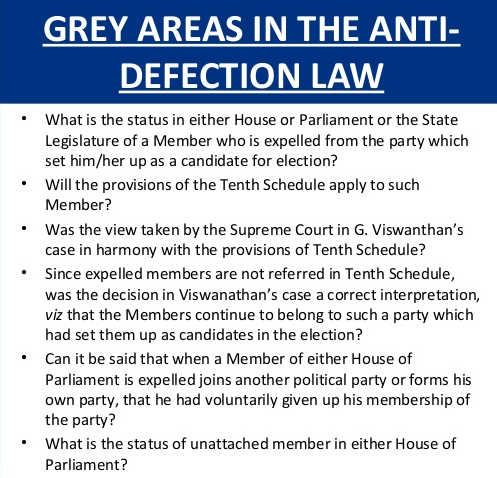Indian Polity
Efficacy of Anti-Defection Law
This editorial is based on “Why the anti-defection law has failed to deliver” which was published in The Hindustan Times on 30/7/2020. It talks about the reasons for the ineffectiveness of Anti-Defection Law.
Recent events in Rajasthan, whereby MLAs violating party’s whip or joining another political party, with an aim to topple an elected government by depriving it of its majority have brought renewed focus on the efficacy of Anti-defection law.
This ongoing political crisis in Rajasthan is neither new nor uncommon, as the “switching of sides” by elected representatives has been increasingly frequent in recent months. The political defections in Karnataka, Madhya Pradesh, Goa and Manipur which amounted to undermining of democratic values.
Given the context, it has become necessary to figure out the reasons that affect the Anti-defection law to act an effective check on the incidences of defection.
Issues With Anti-Defection Law
- Circumvention of Anti-Defection Law: Defecting MLAs have found an innovative method to sidestep the restrictions in the Tenth Schedule and Supreme Court’s direction.
- Instead of formally “crossing the floor” or voting against their party in a confidence motion, they resign from the party.
- This brings down the party’s strength in the House, and the government is toppled.
- A few months later, when by-elections are held, the same MLAs then stand for election on the ticket of the opposition party and are returned to the assembly.
- This, it should be clear, is defection in all, but the most formal sense.
Supreme Court Guidelines on Ant-defection Law
- In the Kihoto Hollohan judgment (1992), the Supreme Court held that Members of Parliament (MPs) and Members of the Legislative Assembly (MLAs) are elected on the political and ideological platform of their party.
- So it is legitimate, the SC said, to hold them to that. If they wish to step away from that ideology, they are free to do so but must seek a fresh mandate from the people.
- Violating Neutrality: BR Ambedkar pointed out soon after the framing of the Constitution, “every constitutional text can be subverted if those charged with running the affairs of government are inclined to do so”.
- Thus, no matter how well-drafted a constitutional provision is, ultimately, its implementation depends upon constitutional functionaries acting in good faith.
- However, in recent times, it can be observed that the office of governors and the speakers have acted in a non-partisan way (acted as an agent of the union government).
- Judiciary Stopped Playing a Proactive Role: Judiciary itself has not proved up to the mark, in pursuit of checking defections.
- During the Karnataka crisis last year, the Supreme Court failed to prevent the toppling of the government, as many MLAs resigned with a motive to reduce the effective majority of the government.
- The validity of Electoral bonds schemes has been challenged against the allegations of allowing for unlimited and anonymous funding to political parties.
- However, despite multiple election cycles, the apex court has taken no action upon it.
Way Forward
Menace of Defection in India is among many issues that affect the process of a free and fair election in India, such as the legally-sanctioned influence of big money in politics, Criminalisation of politics.
Thus, there is a need to carry out holistic electoral reforms to strengthen Indian democracy. Some of the electoral reforms are as follows:
- Need to Regulate Political Parties: There is an ardent need for legislation that regulates political parties in India. Such a law should bring political parties under RTI, strengthen intra-party democracy, etc.
- Minimising Role of Money: To minimise the role of money State funding of elections can be an effective option.
- Statutory backing to Model Code of Conduct (MCC): Giving statutory backing to the Model Code of Conduct will leave no vacuum for the Election Commission of India (ECI) to exercise its residuary power to enforce the Model Code of Conduct.
- Also, the power of the ECI to derecognise political parties on account of violation of the Model Code of Conduct may be incorporated in the Representation of People Act, 1951.
- Final Authority of Election Commission: Chairman/Speaker of the house, being the final authority in terms of defection, affects the doctrine of separation of powers.
- Designating Election Commission as the final authority in dealing with matters of defections may help in curbing the menace of defection.
|
Drishti Mains Question “Anti-defection law is failing to achieve its intended objectives”. Analyse the statement and discuss some measures to reform the anti-defection framework in India. |
This editorial is based on “The Cost of Haste” which was published in The Hindu on July 29th, 2020. Now watch this on our Youtube channel.





